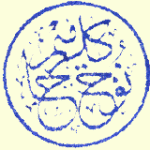-
With Allah, Letter No. 4
By Sh. Nuh Keller
Categories : Islam, Miscellaneous, Other Articles, The Prophet
A monthly letter to incarcerated Muslims
A PDF version can be downloaded here.
Rabi‘ al-Awwal 1445/October 2023
Letter No. 4, Amman, JordanDear Believers: as-Salamu ‘alaykum wa rahmatu Llahi wa barakatuh.
In the Name of Allah Most Merciful and Compassionate: All praise be to Allah Most High, and blessings and peace upon His beloved Prophet Muhammad, a mighty mercy to all worlds of beings.
To commence: Great indeed is Allah who brings forth whom He wills from the night of unbelief, corruption, and evil into the bright daylight of being with the Living One who will never perish, never fail, and never lose. The light Allah has cast into the heart of His Prophet (Allah bless him and give him peace) guides everyone who follows it through the pitfalls of this world to a life of endless happiness, honor, and triumph. Allah says in verse 33.56 of Surat al- Ahzab:
إِنَّ ٱللَّهَ وَمَلَـٰٓئِكَتَهُۥ يُصَلُّونَ عَلَى ٱلنَّبِىِّ ۚ يَـٰٓأَيُّهَا ٱلَّذِينَ ءَامَنُوا۟ صَلُّوا۟ عَلَيْهِ وَسَلِّمُوا۟ تَسْلِيمًا
Truly Allah and His very angels
ever bless the Prophet with mercy and grace:
O you who believe, invoke blessings upon him,
and pray your utmost he be shown
all pure secure peace.Now, when a king chooses an emissary to another nation for a crucial mission, he sends the most impressive individual he can find, for such a person can generally accomplish something. The above verse clarifies the Prophet’s high nobility (Allah bless him and give him peace), and why he should be heeded by all people till the end of time who hope to be saved.
The word inna or “truly” that begins the verse is emphatic. The mention of “Allah and His very angels” before the verb makes it a ‘nominal sentence’ (jumla ismiyya) which is more powerful in Arabic than an ordinary verbal sentence, and indicates—especially with the verb yusalluna “ever bless” in the imperfect tense—thubut or ‘unceasingness.’ The ascription of the angels to Allah in the word mala’ikatahu “His very angels” is termed an idafa al-tashrif or ‘ennobling ascription,’ which emphasizes their nobility in Allah’s sight, for they are the greatest of His creatures, but also isti‘ab or the word’s ‘generalizability’ to all of Allah’s angels without exception. All of them, with Allah, “ever bless the Prophet with mercy and grace.” The unceasing nature of these blessings on the Prophet (Allah bless him and give him peace) denoted by yusalluna is Allah’s encouragement to all Muslims to also bless him perpetually, all the time. Why? Because, like everything Allah asks us to do in His Sacred Law, it does not benefit Him, but rather us, and benefit us a great deal. The ulema of tafsir or ‘scholars of the Quran’s meaning’ tell us the blessings of Allah upon the Prophet (Allah bless him and give him peace) mean Allah’s incomparable mercy upon him, His praise and glory (thana’) for him, His raising his exalted spiritual stations all the higher, and His supreme good pleasure (ridwan) in him. The blessings of the angels for him are istighfar or ‘asking forgiveness’ for him, and making du‘a or supplication for Allah to bless him. Note also that Allah did not say in the above verse “ever bless you” in a direct address to the Prophet, but uses the word al-Nabiyy or ‘the Prophet,’ which is for ta‘dheem or ‘exalted reverence and respect,’ doubly emphasized by the word’s origin, for in comparison, the word rasul or ‘messenger’ focuses on his purpose and mission, while Nabiyy derives from an-nabw min al-ard or ‘a height on the face of the earth,’ emphasizing his lofty prophetic rank above all mankind, as if Allah were saying, “ever bless the High Prophet with mercy and grace.” Imam Sawi has said, “In this verse is the greatest proof that the Prophet (Allah bless him and give him peace) is the locus where divine mercies descend, and the best of all mankind from first to last.”
The foregoing part of the verse is but a tamheed which ‘prefaces’ the main point: “O you who believe, invoke blessings upon him, and pray your utmost he be shown all pure secure peace”— meaning, “O you who believe, because Allah ever blesses him, follow His example and do so also: it is not enough for you to merely be with him, but you must also bless him, and pray for him to receive divine mercies, the raising of spiritual degrees, and honors in the sight of Allah—not the least because the Prophet (Allah bless him and give him peace) was the one who saved all of your lives by bringing you the message of Islam, the Quran, and the sunna, without which you would have been lost, and your lives of no value to you at all, so show some gratitude, even though it is impossible to repay him as he should be, so say the blessings on him, so that Allah may repay him for you by giving him those blessings.” The Sahaba (Companions) asked the Prophet (Allah bless him and give him peace), “O Messenger of Allah, we know how to say as-Salamu ‘alaykum, so how should we say the blessings on you,” and he answered: “Say: Allahumma salli ‘ala Muhammadin wa ‘ala aali Muhammadin kama sallayta ‘ala Ibraheema wa ‘ala aali Ibraheema innaka hameedun majeed(un). Allahumma baarik ‘ala Muhammadin wa ‘ala aali Muhammadin kama baarakta ‘ala Ibraheema wa ‘ala aali Ibraheema innaka hameedun majeed(un). ‘O Allah ever bless Muhammad and those of Muhammad with mercy and grace, just as You blessed Ibrahim and those of Ibrahim with mercy and grace; Verily You are the All-laudable of Favor, the Incomparably Magnificent. O Allah ever lavish on Muhammad and those of Muhammad magnificent blessings, just as You lavished on Ibrahim and those of Ibrahim magnificent blessings; Verily You are the All-laudable of Favor, the Incomparably Magnificent’” (Sahih al-Bukhari, 8.95 (6357). S). Shafi‘i said that in prayers (du‘a), such as this, the word Aal (“those of” above) means ‘all the followers of,’ that is, the entire Umma, rather than specifically his descendants, which this word means in other contexts, just as the Quran sometimes uses Aal Fir‘awn to denote ‘all of Pharaoh’s following, his whole nation,’ not merely his family. So it is simultaneously a du‘a for oneself, as a Muslim who is a member of his Umma, as well as a blessing on the Prophet (Allah bless him and give him peace). The blessings of Allah upon Ibrahim mentioned here echo those mentioned in Genesis 12:3–4, where Allah tells him: “And I will make of thee a great nation, and I will bless thee, and make thy name great; And thou shalt be a blessing: And I will bless them that bless thee, and curse him that curseth thee: and in thee shall all families of the earth be blessed.” Too, the ulema of fiqh or ‘details of Sacred Law’ mention it is praiseworthy (mustahabb) to add Sayyidinaa or ‘the foremost of us’ before the names of Muhammad and Ibrahim (upon them be blessings and peace) in one’s blessings on either or both. There are a great many forms of blessings on the Prophet (Allah bless him and give him peace), and all are tremendous mercy and safety for those who say them.
In the last of the verse, wa sallimu tasliman “and pray your utmost he be shown all pure secure peace” means a prayer to keep him entirely free (saleem) of any shortcomings, troubles, or loss of blessings; while being in perfect security, peace, and pleased serenity. The word tasliman after it, which Arab grammarians term a maf‘ul mutlaq or ‘accusative object,’ energizes this command, and is why I have used the word “utmost” in the translation here, for it denotes takthir al-salam or ‘praying for peace upon him copiously, profusely, frequently, and a great deal’—just as one does with the blessings on him. One is obliged to say both the blessings and peace upon him once in one’s life with the intention (niyya) of performing the obligation (wajib), after which it remains recommended (mandub) to do so, and is rewarded as such by Allah every time one says it. The Prophet (Allah bless him and give him peace) said, “Whoever blesses me once, Allah blesses ten times over” (Sahih Muslim, 1.306 (408). S). What is the result? Allah tells us the answer in verse 33.43 of Surat al-Ahzab: “It is He who blesses you, and His angels, to bring you forth from the depths of darknesses into perfect light; And verily He was ever all-compassionate to believers.” This is a mighty blessing and priceless piece of knowledge, for most of the miseries in our hearts come from real or imagined darknesses, while the greatest happiness comes from the light Allah creates in them. This is why the ulema of Ihsan often prescribe the prayer on the Prophet (Allah bless him and give him peace) for minds that are unbalanced, since the Prophet represents the perfect human balance between jalal or ‘rigor, majesty, and formidableness,’ and jamal or ‘beauty, solicitude, and kindness,’ and the prayer upon him balances emotions, hearts, and minds. The perfect thing for whoever could use more of Allah’s favor, blessings, and mercy in their life.
Question of the Month (in sum): Upon converting to Islam, I gave up my homosexual lifestyle. I thought becoming a Muslim and taking the tariqa would cure me. Since then, I had a spiritual experience that has me now convinced that Allah understands my situation, and that being gay and homosexuality is only truly understood by Allah; thus it may be acceptable. I’ve come to
believe that only Allah truly knows His ruling on my being gay, and so I leave the matter with Allah. Still my question is: should I conceal my true state (being hypocritical instead of being openly honest about who I know myself to be) and remain in the tariqa with my current understanding until Allah miraculously resolves all that which is within me, or should I leave the wird (daily dhikr) and the tariqa?
Answer: The matter of which you speak began long ages ago among seven towns not far from where I write this today. They were the people of Lot (Ar. Lut) and they practiced sodomy. Allah sent them Lot, and when they refused to listen to him, Allah sent angels to tell him to get away by night. Then He sent them a devastating punishment never to be forgotten, turning the entire towns upside down, smashing everything in them to pieces, and annihilating their inhabitants to the man—for their having turned Man’s primordial nature upside down by their crime. Allah mentions these events in a number of verses in His Book, and there is no ambiguity about anything connected with it. All of which is nothing compared to the punishment in the next world: being incinerated in the raging blaze of hell, and all of its other horrors. Disobedient believers who enter the hellfire may undergo any of the punishments mentioned by Allah in the Quran that unbelievers will suffer there, with only one difference: the latter will be punished forever, while the former will eventually leave the flames and torments. In any case, in this world, it is obligatory for all of us to conceal our sins from everyone, except to ask someone who one believes can tell one how to win free from them and stop them. This is what I suggest you do. But do not stop the other good things you are doing, including the wird, for the baraka of these good things may lift you from the ill-things that presently beset you. The experience you mention is a trick of the Devil. To believe something to be halal that even a Muslim child who grew up with Muslims would know is haram is to deny the ma‘lum min al-din bi al-darura, or ‘what is necessarily known to be of our religion,’ and this is kufr, unless one was raised far away from Muslims and doesn’t know it is haram—until one finds out that it is. So you must realize it is a sin, repent, ask Allah forgiveness, and save yourself from indescribable travail, pain, and woe in the next world by omitting it in this. You just have to live out your life without it.
All of which is enough for the moment and till next month, Allah willing; with greetings of peace and felicity to everyone; was-Salamu ‘alaykum wa rahmatu Llahi wa barakatuh.
MMXXIII © NUH HA MIM KELLER







